
Archives of Rehabilitation Research and Clinical Translation
Scope & Guideline
Elevating Standards in Rehabilitation Research and Practice
Introduction
Aims and Scopes
- Rehabilitation Research:
The journal focuses on empirical studies that explore various rehabilitation interventions and their effectiveness across different populations, including those with neurological, musculoskeletal, and cognitive impairments. - Patient-Centered Care:
Research emphasizes understanding the patient experience and outcomes, highlighting patient-reported measures, quality of life, and satisfaction with rehabilitation services. - Innovative Therapies and Technologies:
The journal publishes studies on novel rehabilitation techniques, including the use of technology (e.g., telehealth, virtual reality) and innovative therapeutic modalities (e.g., neurostimulation, robotics) to improve rehabilitation outcomes. - Multidisciplinary Approaches:
Research often involves collaboration across various specialties, integrating perspectives from physical therapy, occupational therapy, psychology, and other fields to achieve comprehensive rehabilitation. - Health Equity and Accessibility:
The journal addresses social determinants of health and emphasizes the importance of equitable access to rehabilitation services for diverse populations, including underserved communities.
Trending and Emerging
- Telehealth and Remote Rehabilitation:
With the rise of digital health technologies, there is a marked increase in studies exploring telehealth interventions and remote rehabilitation strategies, particularly post-COVID-19, which aim to improve access and continuity of care. - Interdisciplinary and Collaborative Care Models:
Research is trending towards interdisciplinary models that involve multiple healthcare professionals working together to provide comprehensive care, recognizing the complexity of rehabilitation needs. - Social Determinants of Health:
An increasing number of studies are focusing on how social determinants of health impact rehabilitation outcomes, addressing issues such as socioeconomic status, access to care, and community resources. - Patient Engagement and Self-Management:
There is a growing emphasis on patient engagement in their rehabilitation process, exploring strategies that empower patients to take an active role in their recovery through self-management techniques. - Precision Rehabilitation:
Emerging research is exploring personalized rehabilitation approaches that tailor interventions based on individual patient characteristics, including genetic, environmental, and lifestyle factors.
Declining or Waning
- Traditional Rehabilitation Models:
There has been a noticeable reduction in studies focusing solely on traditional rehabilitation methods without the integration of innovative technologies or interdisciplinary approaches. - Single-Disease Focus Studies:
Research that focuses on rehabilitation for a single disease entity (e.g., stroke, arthritis) without considering comorbidities or holistic approaches has become less common, as the field increasingly recognizes the complexities of patient populations. - Basic Laboratory Studies:
There is a waning interest in basic laboratory studies that do not translate directly into clinical practice, as the journal increasingly prioritizes research with clear implications for patient care and rehabilitation outcomes. - Static Outcome Measures:
The use of static, one-time outcome measures is declining in favor of more dynamic, longitudinal assessments that capture changes over time and the impact of interventions on daily life.
Similar Journals
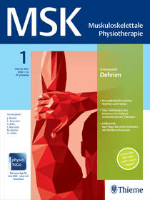
MSKMuskuloskelettale Physiotherapie
Unlocking the potential of musculoskeletal rehabilitation techniques.MSK Muskuloskelettale Physiotherapie is a leading academic journal dedicated to the field of musculoskeletal physiotherapy, exploring innovative practices, research findings, and clinical advancements. Published by GEORG THIEME VERLAG KG, a reputable name in medical publishing, this journal aims to serve as a vital resource for professionals, researchers, and students alike who are passionate about enhancing patient care and therapeutic techniques within the musculoskeletal domain. With its commitment to open access, MSK Muskuloskelettale Physiotherapie ensures that cutting-edge research is readily available to a global audience, facilitating the exchange of ideas and fostering collaboration across disciplines. As the field evolves, this journal seeks to provide a comprehensive platform for the latest developments, emerging methodologies, and transformative insights that are essential for advancing knowledge and practice in musculoskeletal health.

JOURNAL OF BACK AND MUSCULOSKELETAL REHABILITATION
Pioneering research for a stronger, healthier future.JOURNAL OF BACK AND MUSCULOSKELETAL REHABILITATION, published by IOS PRESS in the Netherlands, serves as a vital resource for researchers and practitioners in the fields of orthopedics, physical therapy, and rehabilitation. Since its inception in 1992, this peer-reviewed journal has been committed to advancing knowledge in the prevention and treatment of musculoskeletal disorders, showcasing high-quality research and clinical studies. With a commendable category ranking of Q2 in Physical Therapy and Rehabilitation, as well as Q3 in Orthopedics and Sports Medicine, the journal has established itself as an influential platform in the academic community, holding a Scopus rank that underscores its relevance and impact. While currently not an open-access publication, it offers insightful contributions that are pivotal for improving clinical practices and patient outcomes. The journal's ongoing commitment to excellence is reflected in its focus on the latest methodologies and therapeutic interventions, making it an essential reading for those dedicated to pushing the boundaries of musculoskeletal health.
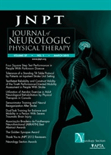
Journal of Neurologic Physical Therapy
Advancing Rehabilitation through Neurologic InsightsJournal of Neurologic Physical Therapy, published by Lippincott Williams & Wilkins, stands as a premier resource in the field of physical therapy with a specific focus on neurology. With an ISSN of 1557-0576 and an E-ISSN of 1557-0584, this journal serves as a vital platform for researchers, practitioners, and students from 2004 to 2024, illustrating its commitment to advancing knowledge in neurologic rehabilitation. It holds a prestigious Q1 ranking in categories such as Physical Therapy, Sports Therapy, and Rehabilitation and Rehabilitation, alongside Q2 rankings in Geriatrics and Gerontology, Medicine (Miscellaneous), and Neurology (Clinical). With an impact factor that reflects its significance, the journal hosts comprehensive studies and clinical insights that propel practice and innovation in neurologic physical therapy. The content is designed to enhance understanding and skills, making it an indispensable resource for those dedicated to improving patient care and outcomes in this critical area of health.
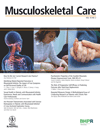
Musculoskeletal Care
Championing Multidisciplinary Approaches in Musculoskeletal CareMusculoskeletal Care is a prestigious journal published by WILEY, focusing on the multidisciplinary field of musculoskeletal health. With its ISSN 1478-2189 and E-ISSN 1557-0681, the journal has established itself as a vital resource for researchers, healthcare professionals, and students dedicated to the study and treatment of musculoskeletal disorders. Since its inception in 2003, it has maintained a strong reputation, achieving a Q1 ranking in Chiropractics and notable placements in other relevant categories, including Nursing and Orthopedics. The journal emphasizes the importance of evidence-based practices, innovative therapies, and collaborative research, making it essential reading for those involved in rehabilitation, sports medicine, and rheumatology. Although not an open-access journal, it remains widely accessible through academic institutions and professional organizations, contributing significantly to the ongoing discourse in musculoskeletal care and enhancing the quality of care provided to patients worldwide.
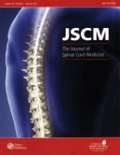
JOURNAL OF SPINAL CORD MEDICINE
Empowering professionals with cutting-edge spinal cord studies.JOURNAL OF SPINAL CORD MEDICINE, published by Taylor & Francis Ltd, serves as a pivotal platform in the field of neurology, particularly focusing on spinal cord research and clinical practices. With an emphasis on advancing knowledge and clinical understanding, this journal has been committed to disseminating high-quality research since its inception in 1995 and continues its mission into 2024. Holding a Q3 ranking in the clinical neurology category, it is recognized among its peers, attracting a diverse readership of researchers, healthcare professionals, and students dedicated to the complexities of spinal cord medicine. Although it does not currently offer open access, it remains an authoritative source of innovative studies, systematic reviews, and case reports that contribute to enhancing patient care and clinical outcomes in the field. With an ISSN of 1079-0268 and an E-ISSN of 2045-7723, the journal stands out as an essential resource for those engaged in spinal cord medicine research and practice.
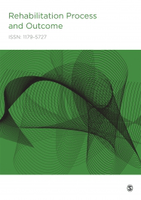
Rehabilitation Process and Outcome
Advancing rehabilitation science for better outcomes.Rehabilitation Process and Outcome, published by SAGE Publications Ltd, is a premier peer-reviewed journal dedicated to advancing the field of rehabilitation science. With an ISSN of 1179-5727 and an E-ISSN of 1179-5727, this open-access journal has been committed to disseminating high-quality research since its inception in 2008. The journal provides a vital platform for researchers, clinicians, and practitioners to share innovative studies, clinical practices, and advancements in rehabilitation methodologies. Its emphasis on open access ensures that findings are readily available to a global audience, promoting collaboration and knowledge exchange in the rehabilitation community. Rainier emphasis on practical outcomes supports the journal's mission to enhance patient care and recovery processes. Based in London, England, Rehabilitation Process and Outcome continues to foster significant discourse in the rehabilitation sector, making it an essential resource for those involved in enhancing recovery strategies and overall health outcomes.
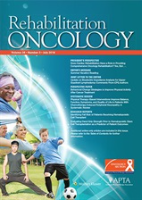
Rehabilitation Oncology
Pioneering Discoveries in the Field of Cancer RehabilitationRehabilitation Oncology, published by Lippincott Williams & Wilkins, is an essential academic journal dedicated to the interdisciplinary field of cancer rehabilitation. Since its inception in 2008, it has provided a platform for illuminating research, clinical practices, and innovative therapies aimed at improving the quality of life for cancer survivors. With an ISSN of 2168-3808 and an E-ISSN of 2381-2427, the journal covers a wide spectrum of topics, making significant contributions across various categories including Oncology, Rehabilitation, and Physical Therapy. Although currently not Open Access, the journal has garnered a notable 2023 Impact Factor status, placing it in the Q3 quadrant across multiple relevant disciplines as per the latest Scopus rankings. This reflects its growing influence in the rehabilitation community and offers vital insights for practitioners and researchers seeking to advance their understanding of patient care post-cancer treatment. With its focus on bridging the gap between research and real-world application, Rehabilitation Oncology serves as a vital resource for healthcare professionals committed to enhancing recovery outcomes in their patients.
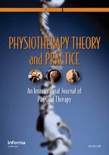
PHYSIOTHERAPY THEORY AND PRACTICE
Advancing the Science of RehabilitationPHYSIOTHERAPY THEORY AND PRACTICE is a leading journal within the realm of physical therapy, sports therapy, and rehabilitation, published by Taylor & Francis Inc. With an ISSN of 0959-3985 and an E-ISSN of 1532-5040, this esteemed journal focuses on the interdisciplinary approaches and clinical practices that advance the science and application of physiotherapy. Ranking in the top 33% of its category as indicated by its Q2 status in the 2023 category quartiles, it serves as an essential conduit for innovative research and evidence-based practices. The journal has been a vital resource since its inception in 1985, continuing to attract contributions that explore the latest developments in rehabilitation and therapy strategies. Although currently not an Open Access journal, PHYSIOTHERAPY THEORY AND PRACTICE remains pivotal in shaping the landscape of health professions, providing insightful articles that empower researchers, practitioners, and students to enhance patient care and treatment strategies in an evolving field.

Advances in Rehabilitation Science and Practice
Fostering Collaboration for Innovative Rehabilitation SolutionsAdvances in Rehabilitation Science and Practice is a pioneering journal published by SAGE Publications Ltd., dedicated to advancing the field of rehabilitation science through rigorous research and innovative practice. With the ISSN 2753-6351, this peer-reviewed Open Access journal facilitates the dissemination of knowledge essential for rehabilitation professionals, clinicians, and academicians. It aims to provide a comprehensive platform for studies that explore new methodologies, interventions, and outcome measures in rehabilitation settings. The journal plays a crucial role in bridging the gap between research and practice, fostering collaboration among researchers, healthcare practitioners, and policy-makers to improve patient outcomes across various rehabilitation disciplines. By offering unrestricted access to high-quality research, Advances in Rehabilitation Science and Practice not only enhances visibility for authors but also encourages a global exchange of ideas in this critical area of health science.
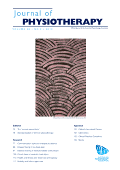
Journal of Physiotherapy
Transforming Lives with Groundbreaking Physiotherapy ResearchThe Journal of Physiotherapy, published by the Australian Physiotherapy Association, is a leading peer-reviewed journal dedicated to advancing the field of physical therapy, sports therapy, and rehabilitation. With a stellar impact factor and ranked Q1 in the 2023 category of Physical Therapy, this journal serves as an essential resource for researchers, clinicians, and educators alike. Located in Australia, it features open access options that allow global dissemination of knowledge, enhancing the visibility of cutting-edge research from 2010 to 2024. With a commendable Scopus Rank of #5 out of 247 in its field, achieving the 98th percentile, the Journal of Physiotherapy is committed to enriching the evidence base within the profession and promoting best practices in physiotherapy. Whether you are searching for the latest clinical studies, innovative treatments, or comprehensive reviews, this journal provides a platform for high-quality scholarship that drives the profession forward.